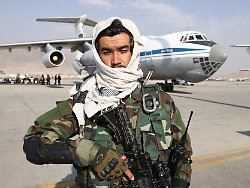Thursday, November 18, 2021
Prospect of humanitarian aid
German diplomats meet Taliban
Food is becoming scarce for half of Afghans. The country is threatened with a humanitarian catastrophe. Germany and the Netherlands are ready to help, but are setting conditions. Delegates from both countries will therefore meet the Taliban in Kabul.
Germany and the Netherlands have promised the Taliban government in Afghanistan support in dealing with the humanitarian plight of the population. Both countries are ready “to provide extensive humanitarian aid, especially with a view to the approaching winter,” said the Foreign Office. To this end, two German diplomats and a Dutch diplomat met high-ranking government officials in Kabul.
The delegation therefore consisted of the Federal Government’s special envoy for Afghanistan and Pakistan, Jasper Wieck, the designated German ambassador in Kabul, Markus Potzel, and the Dutch special envoy for Afghanistan, Emiel de Bont. They had met with Deputy Prime Minister Abdul Ghani Baradar, Foreign Minister Amir Chan Motaki and Intelligence Director Abdul Hak Wasik. “Both sides underlined the importance of continued operational contacts on issues where practical cooperation is both necessary and possible,” said the Foreign Office.
The German embassy in Kabul was evacuated in mid-August because of the rapid advance of the Taliban. Western governments have been in a quandary since the militant Islamists came to power. They want to help the needy population, but at the same time avoid any support for the internationally unrecognized Taliban government. This is especially true because the Taliban marginalize girls and women contrary to their promises. Most schoolgirls in grades seven to twelve are not allowed to attend classes. Most women in the public service are no longer allowed to work. The Taliban have spoken of temporary measures, but they have been ongoing so far.
According to the Foreign Office, the Taliban representatives have now committed to equal access for girls and boys to education. They also wanted to provide humanitarian workers with “safe and unhindered access to communities and people in need”. Afghanistan is heavily dependent on foreign aid, which has been severely scaled back since the radical Islamic Taliban militia came to power in August.
The UN has repeatedly warned of a humanitarian catastrophe in the country. Around half of Afghans are therefore affected by “acute” food shortages. The Federal Foreign Office has now reiterated that any help depends on the behavior of the Taliban. They have to respect human rights, enable Afghans willing to leave and fight the “international terrorist threat”. Berlin has “taken note of” corresponding commitments, declared the Foreign Office. “Another commitment depends on their implementation.”
